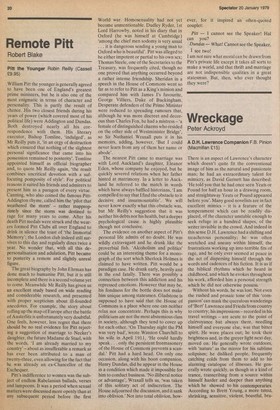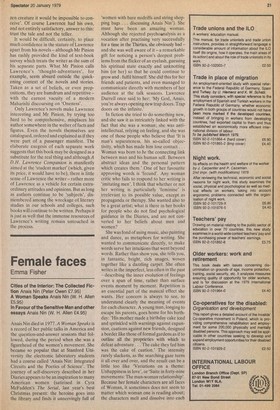Wreckage
Peter Ackroyd
A D.H. Lawrence Companion F.B. Pinion (Macmillan £15) There is an aspect of Lawrence's character which doesn't quite fit the conventional image of him as the natural and passionate man; he had an extraordinary talent for mimicry, as David Garnett has described: 'He told you that he had once seen Yeats or Pound for half an hour in a drawing room, and straightaway Yeats or Pound appeared before you'. Many good novelists are in fact excellent mimics – it is a feature of the temperament which can be readily displaced, of the character unstable enough to seek refuge in a hundred shapes, of the writer invisible in the crowd. And indeed in this sense D.H. Lawrence had a shifting and treacherous personality; he was often wretched and uneasy within himself, the frustrations working up into terrible fits of rage, and he only ever seemed at peace in the act of dispersing himself through the words and cadences of his fiction. It is as if the biblical rhythms which he heard in childhood, and which he evokes throughout his work, afforded him a personal strength which he did not otherwise possess.
Without his words, he was lost. Not even the rushed and prosaic tone of this 'companion' can mask the querulous wanderings of 'Bert' Lawrence and Frieda from country to country; his impressions – recorded in his travel writings – are acute to the point of clairvoyance but always there, needling himself and everyone else, was that bitter spirit. He wore places out; he took their brightness and, in the greyer light next day, moved on. He generally wrote outdoors, with 'nature' as the mirror for his sublime solipsism; he disliked people, frequently catching colds from them to add to his alarming catalogue of illnesses. He generally wrote quickly, as though in a kind of trance, transcribing from a source within himself harder and deeper than anything which he showed to his contemporaries.
According to Brett Young, a more timid, shrinking, sensitive, violent, boastful, bra zen creature it would be impossible to conceive'. Of course Lawrence had his own, and not entirely satisfactory, answer to this: trust the tale and not the teller.
It would be difficult, certainly, to place much confidence in the stature of Lawrence apart from his novels — although Mr Pinion has rashly provided the kind of text-book survey which treats the writer as the sum of his separate parts. What Mr Pinion calls Lawrence's `thought-adventures', for example, seem absurd outside the quickening_ context of the novels and stories. Taken as a set of beliefs, or even propositions, they are humdrum and repetitive — with the earnest vacuity of a modern Maharishi discoursing on 'Oneness'.
Only Lawrence's novels make Lawrence interesting and Mr Pinion, by trying too hard to be comprehensive, misplaces his author somewhere in the welter of facts and figures. Even the novels themselves are catalogued, ordered and explained as if they were part of a passenger manifest. The elaborate exegesis of each separate work suggests that this book may be designed as a substitute for the real thing and although A D.H. Lawrence Companion is manifestly aimed at the 'student market' (which, given its price, it would have to be), there is little sense of Lawrence the writer — rather more of Lawrence as a vehicle for certain extraordinary attitudes and opinions. But as long as authors continue to be 'subjects', dismembered among the wreckage of literary studies in our schools and colleges, such books will continue to be written. Perhaps it is just as well that the immense resources of Lawrence's writing remain untouched in the process.



































 Previous page
Previous page